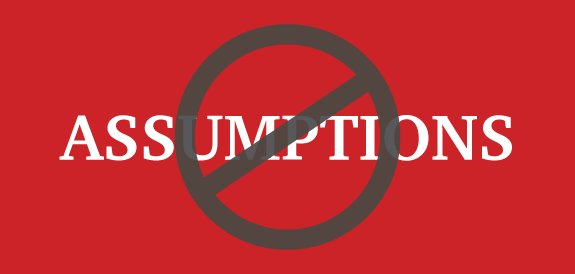It’s our assumptions around the sales process that often sabotage our selling efforts right from the start. Try this next time you get a price objection.
 “Your price is too high” can mean several different things depending upon who is sharing this perceived objection with you, certainly something different to each customer, depending on their point of view. Unfortunately, the majority of salespeople make the costly assumption that the dollar figure they quoted for the service or product offered is what is really in question. And this can be the farthest thing from the truth. Yet, salespeople will continue to forge ahead and react accordingly, based upon the presumption, their honest belief that it’s the price that is getting in the way of earning their business and if they drop their price, offer some discount or “better deal,” they’ll earn a new customer.
“Your price is too high” can mean several different things depending upon who is sharing this perceived objection with you, certainly something different to each customer, depending on their point of view. Unfortunately, the majority of salespeople make the costly assumption that the dollar figure they quoted for the service or product offered is what is really in question. And this can be the farthest thing from the truth. Yet, salespeople will continue to forge ahead and react accordingly, based upon the presumption, their honest belief that it’s the price that is getting in the way of earning their business and if they drop their price, offer some discount or “better deal,” they’ll earn a new customer.
Isn’t it amazing that a salesperson can conduct a one way conversation in their own head and come up with a solution to a customer’s objection without even involving the customer! Yes, salespeople can be incredibly creative, even to the point where it costs us sales.
Dropping the price before validating and isolating the core roadblock(s) to making a purchasing decision often results in diluting your value, damaging your credibility and ultimately losing the sale rather than winning it.
Top Notch Responses
Here are some healthier responses to this common objection, “Your price is too high” that would serve you better than the typical reactionary and adversarial posture salespeople take in an attempt to defend their price. Besides, if this is the selling environment you create, where it’s ‘you vs. the customer,’ we all know who’s going to win in the end.
The next time you hear, “Your price is too high” respond with the following questions. You’ll be amazed at how much more useful intel you can collect just by going a few layers deeper with more powerful and tactical questioning.
- “How high is too high?”
- “Is it the price or the financing terms/monthly installment?”
- “Is it the price or the value/R.O.I. you think you’re going to realize that concerns you?”
- “Are you referring to the price or the budget you’ve allocated for this project?”
- “Compared to what? What are you comparing it to?”
- “I’m sure you have a good reason to feel this way. May I ask what that is?”
- (If comparing to a lower price.) “Before we explore why you feel my price is too high, why do you think the other prices you received are so low?”
After using these questions to respond to this objection rather than react with an adversarial statement, notice how often the real objection that’s getting in the way of moving forward actually comes down to price. Probably only about 15% of the time, instead of what you initially perceived to be much higher. Since the real objection is often several layers deep, it’s going to be the right, pinpoint questions that deliver the relevant information you need so that you can offer a solution that’s going to fit best.
Photo Credit: Keith Nerdin



